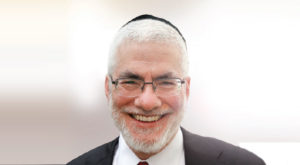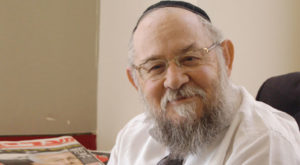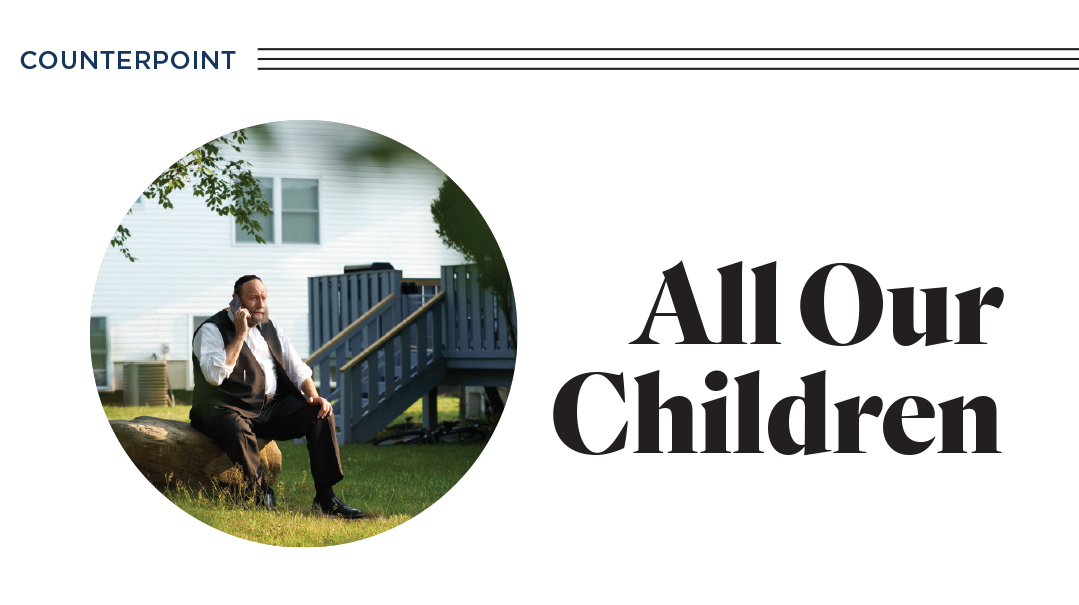Lonely at the Top: The conversation continues

Last week’s panel discussing the vacuum in the vital fields of education, outreach, and askanus touched on practical concerns and lack of motivation. Here are some thoughtful responses

Gratitude Matters — Richard Altabe
I read the series “Lonely at the Top” with great interest. Though the article touches on the challenges of finding quality candidates for open positions in chinuch, it misses the core of the issue.
I am opposed to the formal declaration of a new crisis in Klal Yisrael. Every previous crisis spawned many articles and led to the formation of multiple organizations, but unfortunately the “crisis du jour” was never solved. Why? Because by creating organizations to “fix” the crisis, the burden was taken off the individual member of the klal. New crisis? New askanim, new organizations. Solved? Not really. (Case in point: If every member of Klal Yisrael worked to find shidduchim for singles, would there still be a shidduch crisis?)
So before making the teacher shortage into a crisis, I ask the following: How many readers of this magazine with children in yeshivah this past year took the time to write a note of appreciation to their child’s rebbi, morah, or teacher? In a year when teachers were asked to do more than ever before, how many received even verbal accolades or a small end-of-year gift? (Rebbeim I know say that the number of thank-yous from parents has decreased from years past. This statistic is bolstered by recent articles in secular media that decry the lack of gratitude people have for their children’s teachers.)
Parents need to know a basic fact: Gratitude matters. Gratitude gives a mechanech a sense of pride and value. True, organizations like Chasdei Lev do incredible work in giving rebbeim and moros much chizuk and support, but that chizuk is valued even more when it comes from parents.
Recent research presented in a course I’m taking this summer through Yale University noted that when teachers were asked asked what they wanted to feel right now, the number-one answer was appreciation. In a year when our educators had to stretch themselves like never before, the lack of value our society places on those who choose teaching as a profession is especially painful. It behooves each of us to appreciate and value those who dedicate their lives to educating our youth.
Now that you’ve all been inspired to personally take responsibility for this issue by simply taking the time to give your child’s rebbi and teacher the accolades they deserve, let’s take the value issue a step further.
The kollel system could be a wonderful tool to produce the mechanchim we desperately need. Certain yeshivos, like Yeshiva Chofetz Chaim (and its many branches), take pride in the special mechanchim and chinuch administrators they have produced over the decades. Today, however, in many yeshivos, a young man leaving kollel, even to take a job in chinuch of younger children, administration or kiruv, feels like he is taking a step down. Doing so was never the goal or endgame of his kollel life. While the system nevertheless produces great and talented rebbeim, might it discourage one from entering the world of kiruv or becoming a chinuch administrator?
The shidduch system is equally to blame. The Bais Yaakov movement was originally created to produce women who had the yiras Shamayim and dedication necessary to value a boy who dedicated his life to Torah. Bais Yaakov trained women to be the moros of Klal Yisrael, living inspirational lives dedicated to chinuch and limud Torah. Today, because of our emphasis in keeping our young men in kollel, the Bais Yaakov girl realizes that her family will not be able to live on a teacher’s salary and may seek other employment that provides for greater earning power. It is therefore no surprise that young girls returning from seminary are unwilling to take teacher’s assistant jobs. I was even told that being an assistant teacher is a negative strike on a shidduch résumé.
A system that devalues the women who go into teaching as being incapable of earning enough money to support a kollel family is not simply a system in crisis; it is a system that tells its future talent to pursue higher paying professions.
Of course, teacher salaries need to be increased. The reason they’ve been kept low has been because of another crisis, the tuition crisis. Yeshivos have tried to keep tuition low and have cut costs wherever possible to avoid passing on the increased costs to the parents. While that is an admirable goal, if we keep teacher salaries below market value, we are again sending the message that there is no value in chinuch.
Consider the following: At $15 an hour, a full-day assistant earns about $20,000 per year. Once upon a time, a $20,000 salary for a young woman returning from seminary was considered good pay. Today, however, with $15-an-hour minimum wage, what message are we sending future mechanchim when the entry level position is paid the same as a minimum wage job?!
Finally, besides the lack of gratitude and the lack of finances, do we realize the damage created when we devalue our mechanchim in parent WhatsApp chats? Do we understand the churban we create when our Shabbos table talk becomes a critique of a particular rebbi or morah?
We are not facing a crisis that requires the creation of yet another new organization. Perhaps we simply need to rethink the value we place on chinuch and mechanchim — and the chizuk and gratitude must come from each and every one of us in any way possible. Chinuch is still a value, both for those leaving kollel and for those who marry kollel husbands. That value should be demonstrated by giving these essential men and women the salaries they deserve, and by honoring, respecting and revering those who choose chinuch as their life’s work.
Leader of the Troops — Rabbi Yechiel Spero
With his finger on the pulse of the Jewish community, Yisroel Besser has once again penned a thoughtful yet provocative article, which is sure to ruffle some feathers. It certainly got me thinking.
He asks why so many positions of leadership within the community remain open, and he asserts that many individuals are afraid to climb the ladder, lest they step on the wrong set of toes. Perhaps.
But maybe there’s another possibility.
First, a disclaimer. Those who sacrifice time and finances to help schools and organizations are included in the brachah recited at the end of Shacharis on Shabbos: “HaKadosh Baruch Hu yeshaleim secharam.” So thank you for your dedication. The mosdos need you.
And now, I apologize for the abruptness, but please step aside; that’s where your decision-making in regard to the schools’ chinuch should stop.
Who is making the decisions when it comes to hiring for the higher-up positions of our schools? What qualifications do these individuals possess in order to hire? Better yet, what are they looking for when they hire a principal? Is it possible they lack direction and are shooting or hiring blindly? And who comprises these search committees?
Yisroel cited the example of those stuck in Triple-A affiliates, and captains, sergeants, and lieutenants languishing in the ranks. But who says education works the same way?
Here’s the point. Talented principals don’t necessarily need to have taught, and, perhaps more importantly, great teachers don’t necessarily make effective principals. Actually, as Rabbi Avrohom Neuberger suggests in his eye-opening article, the qualifications for one have little to do with the other.
Ask search committee members about the number-one quality they seek in a potential hire. They may suggest pedagogical expertise or cite a degree in education. Yet that’s not the number-one need; I’m not sure it’s a need at all. A benefit, though not a need.
When seeking a leader for a school, one must find a communicator who knows and understands the needs of children, rebbeim, and parents, one who balances those needs and juggles them accordingly.
The key word is communicator.
As a leader, a menahel must care deeply about the concerns, worries, and anxieties of his students and staff members and effectively address those concerns, while maintaining the dignity and honor of all involved. He must know how to compliment and praise (and be specific) and if not, then find another job. For despite his educational prowess, he doesn’t belong in the principal chair.
That is not necessarily the trait found in great mechanchim and mechanchos. They possess patience and love. And passion for what they do. Heavy doses of it. Sadly, they commit to live with less and smile through it. They are superheroes.
A menahel knows this and acts accordingly. He hires the experts and supports them in any way he can. Never overstepping. Never ignoring.
A menahel must spot when a teacher is having a bad day and find out why. Offer to help. Give an encouraging word. Slip in an extra check to help him get through tough times. Maybe suggest a day off with an offer to pay for an evening out.
Principals view the big picture. They don’t become rattled by uncertainty; they seize the moment and lead by example. They infuse the school with confidence and create a joyful and happy environment. They motivate and inspire.
Additionally, a menahel protects his rebbeim and teachers, validating them and backing them unconditionally, even when they may be in the wrong. He takes the hit for them, and then addresses the issue privately — but always defends his troops.
He is a general, a leader.
When naysayers stop believing in a student, he shows them how to see the good in that child and then fights for that child with every ounce of belief he possesses.
This does not diminish the greatness of a rebbi or morah. In fact, a great menahel understands that the expert in chinuch may be the rebbi. He may, in fact, have more expertise than the menahel, and the menahel treats him as such.
And as Yisroel mentioned, he is not intimidated by someone with greater qualities. He compliments his teachers and rewards them often. Knows the names of his talmidim. Works with parents. Guides them. And learns from them.
Parents will have worries and concerns, some legitimate, some less so. But all parents need a vote of reassurance.
This is the hallmark of a great menahel.
We must find leaders of people.
And follow their lead.
Just curious if that’s what the search committee had in mind.
The Real Reason — Name Withheld
As a seventh-grade rebbi in the Tristate area, I read your feature on the leadership vacuum with great interest. As an insider, I would like to share my perspective.
Mrs. Fleksher is spot on. I teach in a balabatish yeshivah that charges a higher tuition than most yeshivos. Usually my classes have between 22 and 26 boys in the class, sometimes more, sometimes less. Carrying that many worlds in your hands for six hours a day — teaching them, nurturing them, infusing them with a love of Yiddishkeit, raising their learning skills — is a full-time job. The yeshivah expects it to be as well, expecting us to be responsive to parents at night (which of course we should be, as they’re partners in their children’s education) and constantly innovating programs and worksheets.
So why does the yeshivah pay us as part-time employees? A veteran rebbi in our yeshivah earns between the high $50Ks and the low $60Ks, depending on certain bonuses. That’s right in the middle of industry standards.
I am a professional rebbi who provides a benefit to the parents, way more than I get compensated for. The parents are paying for that benefit. It would make sense that the salary should be to some degree commensurate to what I am providing. Instead I work three jobs and sometimes tutor at night to make ends meet.
Do I need to get a job as a cashier in the local grocery store for people to realize there is something wrong here?
There is a feeling among some rebbeim that the yeshivos are taking advantage of our idealism to underpay us for what we do. I don’t blame someone who is suited for klal work but won’t do it, knowing that it will just get harder and harder to provide for a family.
On the flip side, we are so grateful for the support the community provides to help us remain mechanchim. We are aware that others struggle as well, and don’t have the advantage of receiving extra help with the same dignity that we do. But we also know that the service we provide is valuable enough that we should not need handouts.
Which brings me to Rabbi Besser’s point. I see what pressure my menahel goes through. Budgeting, overseeing rebbeim, dealing with students — it’s an incredibly difficult job. The way I and a lot of rebbeim see it is that if we are going to be underpaid and dealing with people’s foibles and expectations, which everyone in klal work is, we’d rather be doing it actually teaching Torah.
Getting to teach Gemara, Mishnayos, and everything else every day is such a privilege. I love what I do! I would never want to switch it for a klal job that a) underpays; b) has people getting mad at you, which always happens when you are in a position of helping others; and c) doesn’t allow you to sit in a beis medrash or a classroom with a sefer and kinderlach, which is what it’s ultimately all about.
When I was offered a job as a rebbi, I went to my own rebbi and asked if I should take this job, knowing it would not provide for my family in the long run. He told me I needed to look at it not as a lifelong career choice, but as a year-by-year decision. Every year I get to teach Torah is an immeasurable gift to me and my family. So far it’s been close to ten years, and I take it year by year still.
So there is your answer. We don’t pursue leadership positions not because we’re scared to shine or skeptical whether our talents will be appreciated. It’s because if we are going to be grossly underpaid and financially disrespected while doing intense klal work, we’d rather do it teaching Torah.
Choosing Not to Rise — M. G.
Thank you for a fabulous magazine that is enjoyed by our entire family.
As I am a high school mechaneches, “Lonely at the Top” immediately grabbed my attention. I applaud Alexandra Fleksher for her quest to make chinuch a “real option” for our “best and brightest.” It can’t be said enough: Klal Yisrael needs qualified and talented teachers now more than ever before. I am quite sure Sarah Schneirer would agree.
In response to Yisroel Besser’s question as to why people in chinuch are not rising to the top, I’d like to share a personal take.
As a mechaneches in a prestigious out-of-town high school, I am in this position because I am drawn to the beauty of Torah and I consider it a privilege to be able to pass this down to my beloved students, who are the very future of Klal Yisrael. Yet I must tell you, as someone who generally aims for the top, I have learned early on that I cannot do so in this area of my life — and not due to a lack of creativity or because I am “scared to shine.”
Several years ago I was sitting at the graduation of our senior class. I found myself wondering, “Did I make enough of a difference to each one of these girls? Could I have done more?” The past four years suddenly seemed too short and I hoped that I had given it my all. And then, like a bolt of lightning, another thought hit me. The very next day was to be my oldest son’s eighth-grade graduation. And I realized that these same questions were going to hit me the next night... And at his 12th grade graduation... And at his chuppah b’ezras Hashem. “Did I do enough? Could I have done more? Did I give it my all?” And that question would repeat itself for each one of my precious children.
At that point, I knew with absolute clarity what I wanted the answers to be. That’s when I realized that I was not going to soar to the top of my teaching “career” (if you want to call it that) — because there are some very significant people who come first in my life, before my precious students. And I want my students to take the same approach in their lives, whether they become teachers, lawyers, or accountants.
So in answer to Yisroel Besser’s question as to why a mechaneches may be failing to “rise to the top,” I have an answer for you. As Gary Keller quotes John Carmack in his best-seller The One Thing, “Focus is a matter of deciding the things you’re not going to do.” And so, I remain a star at Triple-A. Let someone else fill the major league vacancy.
Scared to shine? You tell me.
(Originally featured in Mishpacha, Issue 869)
Oops! We could not locate your form.











